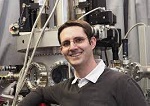New Opportunities for Soft X-Ray Spectroscopy with Free-Electron Lasers
Hosted By: Short Wavelength Sources and Attosecond/High Field Physics Technical Group
02 March 2023 11:00 - 12:00
Eastern Time (US & Canada) (UTC -05:00)Soft X-ray spectroscopy can selectively address specific elements or even the same chemical elements in different environments. Pairing this powerful method with the time resolution enabled by the short and intense pulses from free-electron lasers enables to study of dynamics on electronic time scales, for example, in surface chemical reactions or during phase transitions in complex materials.
Free-electron lasers provide fully coherent beams at unprecedented intensities, where many photons interact simultaneously with the sample. The applications of non-linear and wave-mixing techniques to solid materials with soft X-ray pulses are still in their infancy. First, explorations of fundamental non-linear interactions have demonstrated the method's power, and development efforts are ongoing.
After a general introduction to soft X-ray spectroscopy and the extension from static analysis to femtosecond time-resolved experiments, Dr. Martin Beye will showcase early experiments to discover non-linear processes on solids and discuss the underlying, competing strategies that have provided challenges for experimentalists. Dr. Beye will close by showing a roadmap for the way forward.
Subject Matter Level: Intermediate - Assumes basic knowledge of the topic
What You Will Learn:
• How soft X-ray spectroscopy can be fruitfully used with femtosecond pulses
• How non-linear interactions can provide even more information
• What atomic processes are important to take into account for further developments
Who Should Attend:
• Researchers with complex samples that need novel answers from electronic structure dynamics
• Researchers from high-harmonic generation sources that want to learn about accelerator-driven sources that provide similar pulse properties
•Anyone who wants to learn how researchers at large facilities try to answer the biggest questions
About the Presenter: Martin Beye from Deutsches Elektronen-Synchrotron DESY
 Dr. Beye received his Ph.D. in 2010 from the University of Hamburg, performing early spectroscopy experiments at the free-electron laser FLASH at DESY. After a short PostDoc phase at Stanford, utilizing the free-electron laser LCLS, he was holding a fellowship at the Helmholtz-Zentrum Berlin with the synchrotron BESSY-II that frequently allowed him to further use LCLS in Stanford. In 2016, he became the young investigator group leader at FLASH at DESY and took over the role of interim scientific head of FLASH in 2019.
Dr. Beye received his Ph.D. in 2010 from the University of Hamburg, performing early spectroscopy experiments at the free-electron laser FLASH at DESY. After a short PostDoc phase at Stanford, utilizing the free-electron laser LCLS, he was holding a fellowship at the Helmholtz-Zentrum Berlin with the synchrotron BESSY-II that frequently allowed him to further use LCLS in Stanford. In 2016, he became the young investigator group leader at FLASH at DESY and took over the role of interim scientific head of FLASH in 2019.
